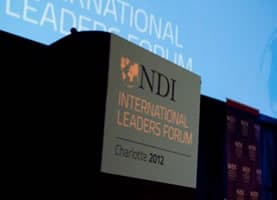
As part of the 49er Democracy Experience, four leading pollsters discussed how their profession has adapted to the high-tech world in shaping campaigns. Part of the National Democratic Institute’s three-day forum, the panel discussion was held Wednesday, Sept. 5, in the Belk Theater in the Blumenthal Performing Arts Center.
Moderated by BBC anchor Katty Kay, the panel featured Stanley Greenberg of Greenberg, Quinlan, Rosner Research; Whit Ayers of North Star Opinion Research; Peter Hart of Hart Research Associates; and Jon Cohen, director of polling at the Washington Post.
“These are the people the campaigns turn to every four years to tell them what the electorate is thinking,” said Kay.
Each of the panelists was given an opportunity to talk about their work on the 2012 presidential race between President Barack Obama and Republican challenger Mitt Romney.
In his segment, Hart showed a chart that illustrated the level of “economic confidence” American voters had in the last several administrations – both Republican and Democrat. The magic number necessary for re-election was an 85 percent rating.
While Presidents Reagan, Clinton and George W. Bush all remained above the critical number, he said, this was not the case for Jimmy Carter, George H.W. Bush – or President Obama.
“His current rating is just below 85 percent,” Hart said.
Greenberg, who recently co-authored a book on the 2012 race titled, “It’s the Middle Class, Stupid!” with political consultant James Carville, said both nominees are trying to appeal to the same voters.
“This election is about the future of the middle class,” he said.
The panel discussed the use of focus groups in their work because the campaigns want to know what voters are feeling along with what they are thinking.
“You need to sit in on one of these focus groups to understand how scared people are right now,” said Ayers.
Cohen said Romney should be well ahead in the polls based on Obama’s negatives in economics.
“An incumbent (president) has never won in a years when he has negative numbers running the economy,” he said. “Obama should not be running neck and neck based on these numbers.”
The panelists said their jobs have had to change rapidly to keep up with the times. Back in the 1960s, pollsters would knock on doors. That evolved into telephone polls. Now, with many Americans giving up their landline phones, pollsters are using cell phones.
They agreed this too is likely to change before the next presidential campaign, with polls being conducted over the Internet.